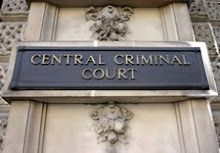Daily Mail online 3rd JAN , 2004
Ghost-hunters remember spectral case
Ghost-hunters and lawyers were forming an alliance to mark the 200th anniversary of one of the greatest curiosities in English criminal law.
They were marking the bicentenary of the case of the "Hammersmith Ghost", in which a vigilante, Francis Smith, shot dead a man after mistaking him for a terrifying spook. The defence mounted by Smith in his trial sparked a legal debate which ran for 180 years.
"This case bristles with legal and supernatural interest," said barrister Alan Murdie, who has written about the incident for the latest issue of Justice of the Peace magazine. Members of the Ghost Club co-founded by Charles Dickens were meeting at the scene of the spectral shooting in west London, to drink at the pub where the victim's body was carried after the shooting.
At Christmas and New Year 1803-1804 there were a series of reports of a frightening phantom which was haunting Hammersmith churchyard, said Mr Murdie. The apparition, dressed in white robes, was said to attack passers-by. Two people had been left seriously ill from the shock of encountering the ghostly figure, and the pregnant wife of a local locksmith was even reported to have died. Off-duty customs officer Smith, 29, was drinking in a nearby inn on January 3 when he heard the sensational tales and launched a vigilante patrol in Black Lion Lane armed with a gun, said Mr Murdie.
"At around 11pm, Smith was rewarded by a figure in white appearing in the lane.
"Challenging the apparition he demanded to know its identity. When the figure moved towards him, Smith discharged his gun," said Mr Murdie.
Only as he examined the shape on the ground did Smith realise it was a man - 23-year-old bricklayer whose name was either James or Thomas Milwood - whom he had shot through the jaw. Milwood, whose surname was also recorded as Milward, was wearing the flannel clothing and white apron then associated with his trade.
Smith was taken into custody and his trial for "wilful murder" began just eight days later at the Old Bailey. Smith's crime raised the question of whether someone could be held liable for their actions if they used force as a result of an unreasonable but mistaken belief. In other words, would you get away with murder if you said: "I did kill him, but I honestly thought he was a ghost"?
Mr Murdie said the jury initially returned a verdict of manslaughter, apparently accepting claims that he honestly thought he was shooting at a spectre. But Lord Chief Baron Macdonald steered the jury back in the direction of murder, resulting in Smith being sentenced to death. Legal debate about the self defence issues raised by the Hammersmith Ghost case rumbled on for decades.

No comments:
Post a Comment